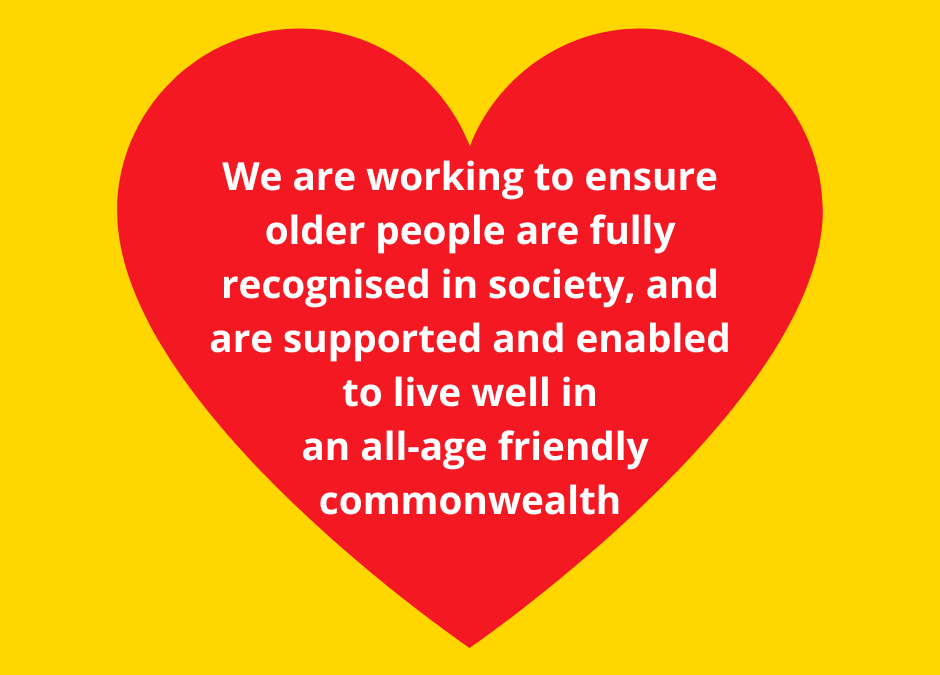The Commonwealth is home to 2.5 billion people, and includes both advanced economies and developing countries. 32 of the members are small states, including many island nations.
According to the data platform Knoema, approximately over 2.38 million people aged 60+ were in the Commonwealth in 2020. But we need to bear in mind, high adult mortality limits the number of people that live into their 60s and 70s in some Commonwealth countries. For instance, ‘old’ in Kenya is substantially younger than ‘old’ in Canada.
The World Health Organisation estimates 1 in 6 people over 60 years of age suffers from abuse; globally that is nearly 141 million people. This number may be much higher as neglect, abuse and violence of older people are among the most hidden and underrepresented violations of human rights.
The World Elder Abuse Awareness Day (WEAAD), designated as 15 June, is an opportunity for communities to promote a better understanding of elder abuse and raises awareness about the cultural, social, economic and demographic factors that lead to abuse of older generations.
Types of abuse
The WHO highlights there are five types of elder abuse which violate the dignity of older people:
- Neglect
- Psychological abuse
- Financial abuse
- Physical abuse
- Sexual abuse
Furthermore more, in a cultural context there are additional risk factors of abuse, such as older women being accused of witchcraft or being forced into a marriage.
Sadly too, the WHO points out rates of abuse of older people are high in institutions such as nursing homes and long-term care facilities, with 2 in 3 staff reporting that they have committed abuse in the past year.
Discrimination and ageism
Stereotypes about older people can be used to justify elder abuse or minimise its impact. All forms of discrimination, such as racism and sexism, are unacceptable, but ageist attitudes appear to go unchallenged.
Indeed, our white paper, Ageism in the Commonwealth, showed how COVID-19 has exposed the urgent need for further recognition and protection of the rights of older people in Commonwealth countries.
This negative behaviour is having an affect on not just the mental health, but physical health of the older populations.
The executive summary of The Royal Society for Public Health’s (RSPH’s) study That Age Old Problem: how attitudes to ageing affect our health and wellbeing highlights:
- Ageist attitudes harm older people as they lead to direct age-based discrimination – which can promote social exclusion, impact on mental health, and affect wider determinants of health like employment.
- Ageist attitudes also harm individuals who, as they grow older, begin to apply negative age stereotypes to themselves. Previous research has shown that those with more negative attitudes to ageing live on average 7.5 years less than those with more positive attitudes to ageing. 1
- There is now a growing body of research evidencing the real-life consequences that negative attitudes to ageing have on individual health outcomes such as memory loss, physical function, and even the risk of developing dementia.
Take the #RefuseToAbuse pledge on 15 June
This World Elder Abuse Awareness Day, we are joining HelpAge International’s call for everyone to stand up for older people, to reject all and every kind of abuse and to understand that ageism can be the first step towards justifying abuse.
As well as raising awareness and looking at addressing and resolving the physical and mental abuse, let us look how we address ageism in our society; the more we treat older people with respect and dignity, the more capable they believe themselves to be and the more resilient they become.
We have pledged to work to ensure older people are fully recognised in society, and are supported and enabled to live well in an all-age friendly commonwealth.
What is your pledge?
Find out how to make your pledge here.
Growing old is a privilege – something sadly this pandemic has meant many people can’t do. Let us work towards a more inclusive society, where every human being, whatever their age, is treated with dignity and respect.
Support us
We are a charity, and we believe in an all-age friendly Commonwealth in which ageism is challenged and the contributions of people of all ages are valued. We believe that the strongest societies are those that combine the energy, vitality and potential of younger people with the wisdom and experience of elders.
If you’d like to be a part of our story, join us in making changes to older people’s lives across the Commonwealth.
Donate, partner and follow us on social media; we are active on Facebook, Twitter, LinkedIn and Instagram.
You can donate to us by:
- Credit card: Visa, Mastercard and American Express
- Apple Pay
- Google Pay
- PayPal

